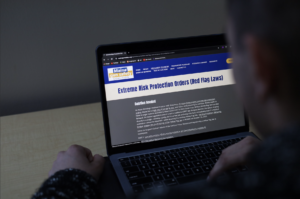On Thursday, Sept. 20, FUSION Bangor held a Conversation with the Candidate event with Attorney General Janet Mills, the Democratic gubernatorial candidate. The event drew a crowd of around 50 people from a range of demographics.
Before the event began, Mills stopped and talked to every spectator at the event, discussed shared interests and thanked everyone for joining the event.
Mills has a long history of public service, including her time serving as assistant attorney general, where she prosecuted homicides and other major crimes, as well as attorney general for the state of Maine.
The event began with a short introduction from Allison Economy, who is the chair of FUSION Bangor’s Steering Committee.
“After a few years of being assistant attorney general, [Janet Mills] was elected the district attorney for Androscoggin, Franklin, and Oxford counties, making her the first female elected to the DA,” Economy said.
“In that role, Janet saw firsthand just how the criminal justice system has frequently failed victims of domestic violence, and so she co-founded the Maine Women’s Lobby where she advocated for battered and abused women, and she also was elected to the Maine House of Representatives in 2002,” Economy said.
Mills has been a strong advocate for the opioid epidemic, which is becoming a more prominent issue in the state of Maine.
“I am the Chief Law Enforcement Officer of Maine,” Mills said. “I have given Narcan out to over 80 police departments, including Bangor. Paul LePage once said that ‘Narcan does not save lives, it postpones death,’ and that cut me to the core. As a Maine person, it’s hard to hear such a callous statement from someone in the government.”
According to Mills, 37 states have supplied Narcan to police departments without controversy.
After the introduction and speech from Mills, the room was opened for questions, and many attendees took the opportunity to pose questions to Mills and thank her for her government service. A major point of conversation was pharmaceutical companies.
“It’s time to stand up to the bullies [pharmaceutical companies],” Mills said. “One challenge that I want to take on is addressing the high cost of prescription drugs. My husband passed away four years ago and it was a tough year, he had a stroke. It wasn’t an instantaneous passing. There [were] about 11 months where we struggled with insurance companies with high deductibles. And I thought, ‘this is tough for us and I work full time. I’m trying to take care of my husband’s needs which were so far greater than ever. This is tough for us, but is no different than what thousands of Maine families go through all around the state. This is no different and incredibly-complex and unnecessarily confusing healthcare system. You’re dealing with deductibles and copays and the ridiculous cost of prescription drugs. If you’re not an advocate yourself, you barely have an advocate.”
Mills says that while the challenges have been difficult to deal with personally, she has taken it as a learning experience and has met future constituents through these encounters.
“It’s a shameful situation,” Mills said. “I also have gotten to know a lot of wonderful people.”
Another issue that is high on Mills’ list of priorities is childhood education. Test scores in reading, math and sciences throughout the third and fourth grade years are scoring below average throughout the state. Mills made a promise to the crowd that this issue will be addressed.
Throughout the event, Mills assured the crowd that she “can talk the talk and walk the walk” and that she “will stand up for the people of Maine.” She did not explicitly lay out a plan during this meeting on how she plans to keep college graduates in the state of Maine, but she assured the crowd that this is something she is working on.
When discussing jobs in Maine, Mills said she was interested in talking about renewable energy and creating more positions in this field.
“I’ve talked to people working in solar energy, and they’re mainly millennials,” Mills said. “There are less than 700 people working in solar energy in Maine … the state of Massachusetts has over 14,000 workers in this field.”
While discussing job growth, members of the audience suggested that Maine needs to move into the 21st century by improving cyber-security and statewide internet access.
Overall, the crowd was responsive to Mills’ ideas and asked many questions that both challenged her and complemented what she has already done for Maine.
The gubernatorial election will be held on Tuesday, Nov. 6, 2018.










